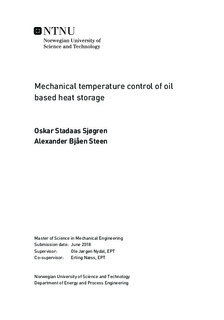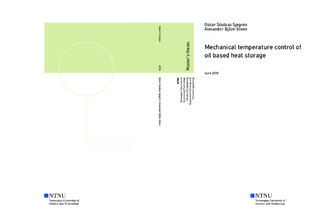| dc.description.abstract | A cooking application and a mechanical temperature controller based on the thermal expansion of sunflower oil were constructed and tested. Both components are parts of a solar cooking system, storing energy in an oil-based rock bed, made in the project work "Solar Heat Storage In Oil Based Rock Bed". This thesis is a part of a network project with universities in Mozambique, Uganda, Ethiopia and Tanzania, and focuses on energy supply to rural and off-grid communities in Africa. The motivation is to store energy from renewable energy sources, for later to be used in food preparations after sunset. Moreover, a simple system is desired, to make the operation and maintenance as easy as possible. This functional mechanical temperature controller will provide more flexibility to the solar cooking system, making it feasible for more settings than the system constructed in the project work.
A mechanical temperature controller was made from two components; a piston actuator and a sliding valve. Three piston actuator designs were constructed and tested, all of which were connected to a closed pipe system with a copper coil filled with sunflower oil. The copper coil was submerged in a container holding sunflower oil and a heating element. During heating, the sunflower oil inside the copper coil expands due to the temperature change, giving a displacement of the piston actuator. The displacement is the motion which controls the sliding valve.
Three sliding valve designs were constructed and tested, all utilising the linear motion from the piston actuator. The valve determines the flow direction, either towards the heat storage or for further heating, depending on the flow temperature. The valve can be used with and without circulation of the oil.
Leaks caused problems throughout the production and tests of the components. A functional sliding valve was successfully constructed, whereas the first piston actuators were faulty due to leaks. The accuracy of the piston actuators made in the workshop at NTNU was not satisfying. Therefore, prefabricated pneumatic pistons were acquired. Preliminary tests gave promising results. Nevertheless, tests of the full system were not conducted due to the limited time.
Two designs for a cooking application were made using a practical and a theoretical approach. The practical approach design was constructed and tested. The cooking effect was promising compared to other solar cookers, but it needs to be upscaled and further improved in order to deliver energy in the same order of magnitude as already established solar cookers.
A test setup of the solar cooking system was made at Makerere University, Kampala, Uganda. The fill valve from the co-project was used as the temperature controller. Demonstrations proved the system made at NTNU is capable of being reproduced locally and is a concept suited for further development. | |

